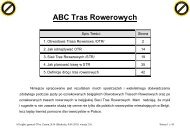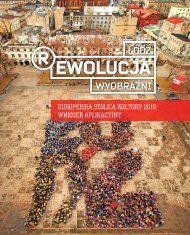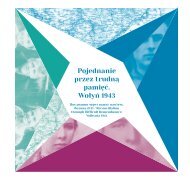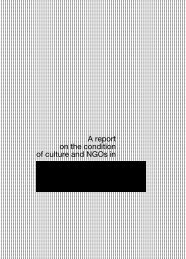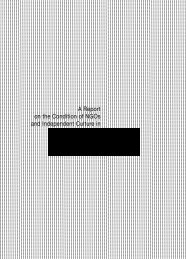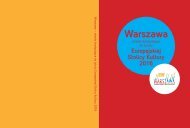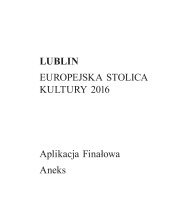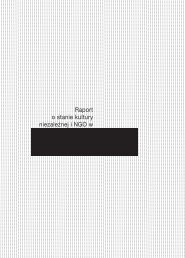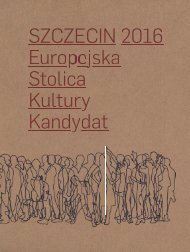Lublin 2016 â Appendix - Kultura Enter
Lublin 2016 â Appendix - Kultura Enter
Lublin 2016 â Appendix - Kultura Enter
Create successful ePaper yourself
Turn your PDF publications into a flip-book with our unique Google optimized e-Paper software.
Activities that help people feel well, fit and happy have been identified in a research commissioned by<br />
the British government (Foresight Mental Capital and Well-Being, UK Government Office for Science<br />
2008). The results of this research are mirrored in Five Ways to Well-Being.<br />
• Connect. With people around you. With family, friends, colleagues and neighbours. At home, work,<br />
school or in your local community. Think of these as the cornerstones of your life and invest time<br />
in developing them. Building these connections will support and enrich your every day.<br />
• Be active. Go for a walk or run. Step outside. Cycle. Play a game. Garden. Dance. Exercising makes<br />
you feel good. Most importantly, discover a physical activity you enjoy and that suits your level<br />
of mobility and fitness.<br />
• Take notice. Be curious. Catch sight of the beautiful. Remark on the unusual. Notice the changing<br />
seasons. Savour the moment, whether you are walking to work, eating lunch or talking to friends.<br />
Be aware of the world around you and what you are feeling. Reflecting on your experiences will<br />
help you appreciate what matters to you.<br />
• Keep learning. Try something new. Rediscover an old interest. Sign up for that course. Take on a<br />
different responsibility at work. Fix a bike. Learn to play an instrument or how to cook your favourite<br />
food. Set a challenge you will enjoy achieving. Learning new things will make you more confident<br />
as well as being fun.<br />
• Be generous. Do something nice for a friend, or a stranger. Thank someone. Smile. Give your time<br />
to someone else. Join a group. Take notice of other people’s needs just as you notice yours. Seeing<br />
your own happiness within a greater whole can give you an unbelievable satisfaction and build relationships<br />
around you.<br />
Cultural Development<br />
Strategy<br />
International medical, public health and sociological research shows that people who observe these rules<br />
feel better and live longer. These rules seem easy to follow and their significance lies in the fact that<br />
they have been scientifically proven to be of fundamental value for quality of life and life expectancy.<br />
Participation in culture enables anyone to implement these recommendations in the easiest and most<br />
stimulating way.<br />
• Connect. Culture is a social activity. From the shared interests that bring people together to sports<br />
clubs or a drama group to the collective experience of audiences in performances and festivals. Culture<br />
furnishes sensations, tales and images that we can share, talk about and argue about.<br />
• Be active. Sport is an obvious and very important way to promote healthy lifestyle; dance is even<br />
more popular: from nightclubs to weddings, from folk dances to ballroom dancing; dance is always<br />
an art form. But also walking through a city or a gallery, going out to concerts and taking part in<br />
local celebrations - all these keep us fit and active.<br />
• Take notice. Art observes - and questions - the world: it is all about noticing things, producing<br />
experiences and sharing that with others. We capture special moments through poetry, photography,<br />
and stories (and share them on Facebook and Flickr). We take part in private and public rituals<br />
to mark symbolically the times that matter.<br />
• Keep learning. Culture makes learning a pleasure, whether it’s the discovery of a new book that<br />
you just have to share with a friend, fascination with new music, or learning the steps of a new dance.<br />
To express yourself in culture, we constantly and almost involuntarily improve our soft and hard<br />
skills that, if taken as a theory or an educational program, would not be that appealing.<br />
• Be generous. Culture is both priceless and worthless. A picture, book or a music album have little<br />
usefulness compared with a loaf of bread or piece of clothing, although they can be traded (thus developing<br />
the creative economy sector). Pieces of art are only carriers or traces of what really matters<br />
- the human experience of art, shared with others, unique and unrepeatable and, in a profound<br />
sense, as much a gift as life itself.<br />
74



